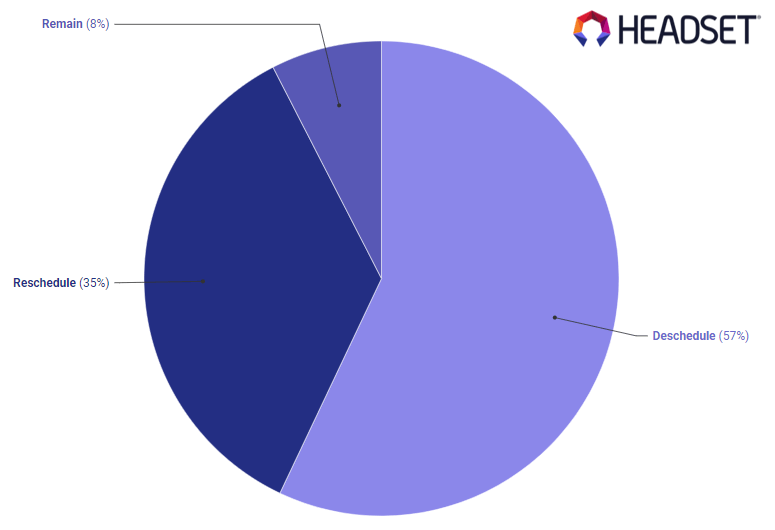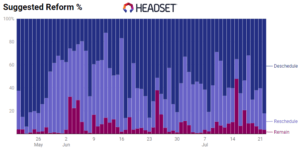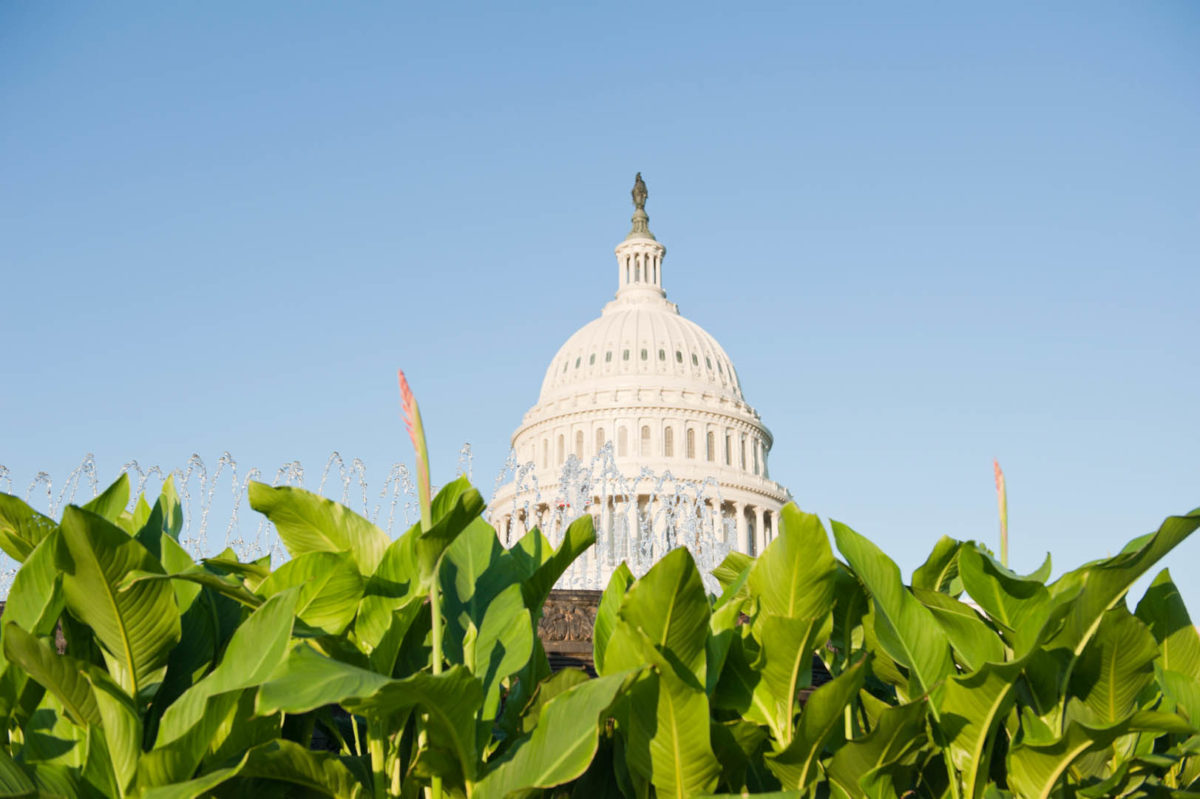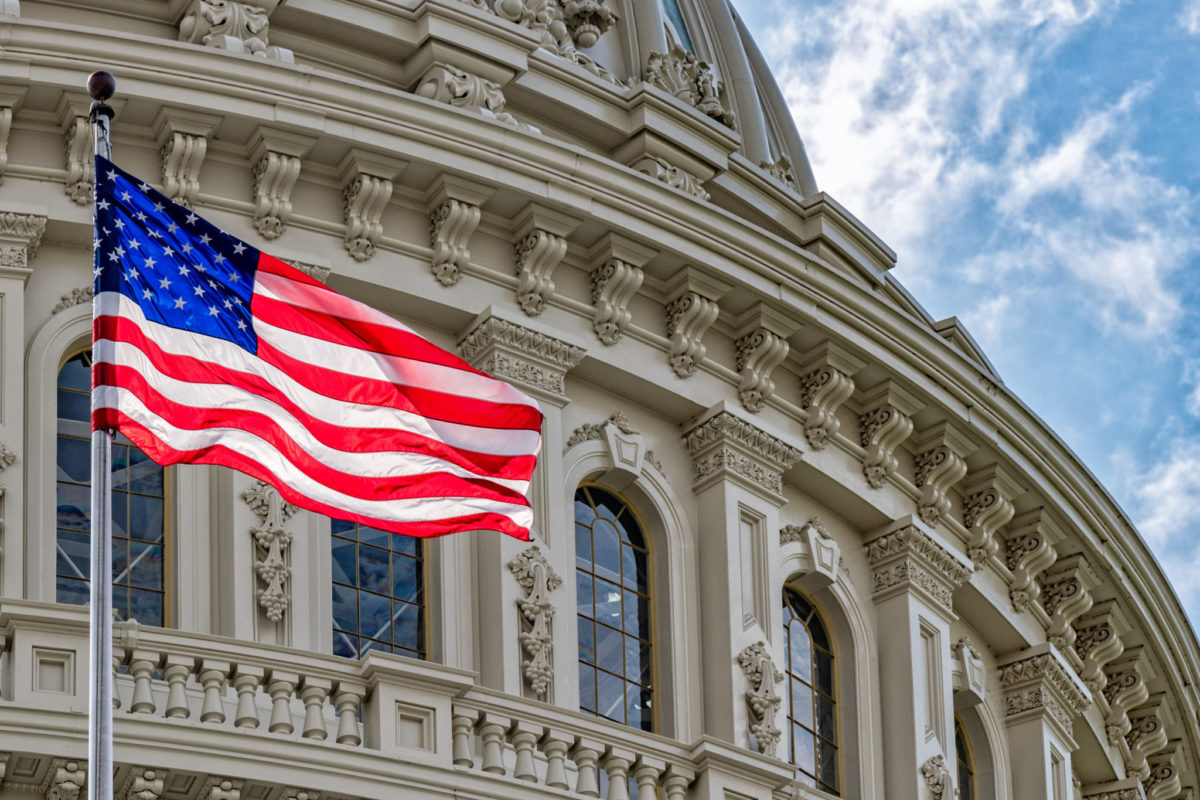Overwhelming Support for Marijuana Rescheduling Expressed in Public Comments to the Department of Justice

FOR IMMEDIATE RELEASE
July 23, 2024
CONTACT:
Aaron Smith, NCIA CEO and Co-Founder
(888) 683-5650, Aaron@TheCannabisIndustry.org
Cy Scott, Headset CEO
(888) 784-3237, cy@headset.io
Overwhelming Support for Marijuana Rescheduling Expressed in Public Comments to the Department of Justice
Cannabis industry advocates press for swift reclassification accompanied by guidance that protects existing state-based cannabis programs
WASHINGTON, D.C. – A sixty-day public comment period for the Department of Justice’s proposal to reclassify marijuana from a Schedule I to a Schedule III substance in the Controlled Substances Act closed last night.
More than 40,000 comments were submitted by various agencies, organizations, academics, and concerned citizens. An overwhelming 91% of comments were submitted in favor of the rescheduling proposal or making it legal under federal law, according to an analysis of the data conducted by Headset. The analysis found that among those supporting a change 56% advocated for complete descheduling of cannabis and 35% supported rescheduling to a less restrictive category.
The National Cannabis Industry Association (NCIA) submitted comments supporting the proposal to move cannabis to Schedule III and is also calling for administrativeguidance to ensure that state cannabis programs are protected from federal interference. The association, which represents over 500 legal cannabis businesses, also called on further action to remove cannabis from the Controlled Substances Act (CSA) and establish federal regulations for the drug.
“It’s clear: decades of scientific data, medical literature, and the experience of millions of American patients using it legally under the care of a physician all show that marijuana absolutely does not belong in Schedule I of the CSA. Reclassifying marijuana to Schedule III is a positive first step in aligning federal and state law, however, we continue to assert that removing marijuana from the CSA entirely would be the best and most appropriate action.
We again emphasize that any reclassification of marijuana should be accompanied by guidance to ensure successful state programs are not disrupted by inappropriate federal enforcement of the CSA. Public health and safety are best served by the elimination of the illicit market and the regulation of marijuana and marijuana products. We urge the relevant departments to move expeditiously in publishing the final rule related to this topic,” NCIA’s comments conclude.
NCIA also submitted statements from dozens of members attesting to the successes seen with state cannabis regulation as well as the medical value of cannabis.
Read NCIA’s complete comments here.
Just over half of Americans live in a state that has made cannabis legal for adults over 21 and three out of four Americans live in a state that has legalized cannabis for medical use. A November 2023 Gallup survey found that 70% of Americans support making cannabis legal for adults and a recent Pew Research Center poll found that less than 10% of Americans still support marijuana prohibition.


###
The National Cannabis Industry Association (NCIA) is the largest cannabis trade association in the U.S. and the only organization representing small and independent cannabis-related businesses at the national level. NCIA promotes the growth of a responsible, sustainable, and inclusive cannabis industry and works for a favorable social, economic, and regulatory environment for that industry throughout the United States.
National Cannabis Industry Association Responds to FDA Statement on Cannabidiol (CBD) Regulation

FOR IMMEDIATE RELEASE
January 26, 2023
Contact:
Aaron Smith, CEO and Co-founder
(303) 223-3554
Bethany Moore, Director of Communications
(303) 223-9727
Communications@TheCannabisIndustry.org
National Cannabis Industry Association Responds to FDA Statement on Cannabidiol (CBD) Regulation
The Food and Drug Administration concludes a new regulatory pathway is needed for CBD products; advocates call for swift congressional action on cannabis policy
Washington, DC – Today the Food and Drug Administration announced that it has concluded that regulations governing food and supplements would not be appropriate for Cannabidiol (CBD) products and that the agency will work with Congress to develop a new way forward.
Cannabis industry advocates are disappointed with this result after the FDA’s protracted study of the issue since 2019 but are hopeful the decision will put more pressure on Congress to move to sensibly regulate CBD and other cannabis products.
“Today’s announcement by the FDA underscores the urgent need for Congress and the Administration to take swift action to modernize federal cannabis policy and regulate CBD and other products appropriately and in harmony with the vast majority of states that have already legalized cannabis in some form,” stated Aaron Smith, National Cannabis Industry Association (NCIA) CEO and Co-founder. “A vibrant state-regulated industry has formed to safely provide cannabinoid products and medicines to millions of Americans, which has the support of the vast majority of U.S. voters. Moving forward with bi-partisan federal cannabis reform this year would be both good public health policy and good politics.”
In 2019, NCIA published the white paper Adapting A Regulatory Framework For The Emerging Cannabis Industry, which outlined recommendations for four “regulatory lanes” for cannabis products, including CBD and other non-psychoactive cannabinoids.
A November 2022 Gallup survey found that 68% of Americans support making cannabis legal for adults and a recent Pew Research Center poll found that less than 10% of Americans still support marijuana prohibition.
# # #
The National Cannabis Industry Association (NCIA) is the largest cannabis trade association in the U.S. and the only one representing small cannabis businesses at the national level. NCIA promotes the growth of a responsible, sustainable, and inclusive cannabis industry and works for a favorable social, economic, and regulatory environment for that industry throughout the United States.
Cannabis Administration and Opportunity Act Introduced in U.S. Senate

FOR IMMEDIATE RELEASE
Thursday, Jul 21, 2022
CONTACT:
Bethany Moore, Communications Director
(240) 678-2654, Communications@TheCannabisIndustry.org
Cannabis Administration and Opportunity Act Introduced in U.S. Senate
Legislation Would Institute Tax and Regulatory Structure for Legal Cannabis;
National Cannabis Industry Association Applauds Historic Measure, Concerned About Potential Impact on Small Businesses
WASHINGTON, D.C. – Today, Senate Majority Leader Chuck Schumer (D-NY) along with Finance Committee Chair Ron Wyden (D-OR), and Sen. Cory Booker (D-NJ) introduced the Cannabis Administration and Opportunity Act (CAOA) which is now the Senate’s only pending legislation that would provide comprehensive cannabis policy reforms across the nation.
The landmark bill would remove cannabis from the federal Controlled Substances Act and move regulatory responsibility from the Drug Enforcement Administration (DEA) to the Alcohol and Tobacco Tax and Trade Bureau (TTB), the Food and Drug Administration (FDA) and other agencies to protect public health and safety. The legislation would also allow the state-regulated medical and adult-use cannabis industries already in place in 37 states to operate without federal interference.
The Senate Democrats’ CAOA would also institute a federal excise tax of 5-25% on cannabis on top of the already-hefty state taxes imposed on the industry, concerning advocates for small cannabis businesses and equity operators.
“We applaud the authors of this legislation for working to bring federal law into harmony with the states and the vast majority of voters who have called for an end to prohibition,” said Aaron Smith, co-founder and chief executive officer of the National Cannabis Industry Association. “We look forward to working with Senators on both sides of the aisle to improve the tax provisions in this bill on behalf of small cannabis businesses and eventually pass it into law.”
The long-awaited CAOA Act was introduced after a bill sponsors circulated a discussion draft last year. NCIA and other advocacy organizations provided comprehensive feedback to the bill’s authors last year. Notable changes to the legislation include:
- Increases the permissible THC by dry weight from the current 0.3 percent to 0.7 percent and refines the definition of “hemp,” and consequently “cannabis” by taking into account the total THC in a cannabis product, rather than just delta-9 THC.
- Changes to the weight quantity to qualify a person for felony cannabis distribution or possession charge under the section from 10 pounds to 20 pounds.
- Provides that a court shall automatically, after a sentencing review, expunge each federal cannabis conviction, vacate any remaining sentence, and resentence the defendant as if this law had been in place prior to the original sentencing.
- Enables a noncitizen who has received a deportation order based on a cannabis-related offense to file a motion to reconsider that decision. If the motion to reconsider is filed within 30 days of the removal order, the motion may allow for cancellation of the deportation order.
- Establishes a new 10-year intermediary lending pilot program in which SBA would make direct loans to eligible intermediaries that in turn make small business loans to startups, businesses owned by individuals adversely impacted by the War on Drugs, and socially and economically disadvantaged small businesses.
- Removes the requirement to maintain a bond for any cannabis business that had less than $100,000 in excise tax liability in the prior year and reasonably expects excise tax liability in the current year to be below such amount.
- Incorporates rules similar to rules currently applicable to permitted malt beverage producers and wholesalers.
Whitney Economics submitted a report outlining concerns with the tax plan, finding that the CAOA would impose an additional $1.1 billion in taxes on the already-struggling and cannabis industry.
“Introducing this far-reaching bill is a historic and important effort but we hope that the Senate moves quickly to pass the bi-partisan SAFE Banking Act which would provide tangible and immediate relief to small businesses and improve public safety by opening access to banking and financial services in our industry,” added Smith.
The SAFE Banking Act has been approved by the House of Representatives seven times and the Senate version of the bill (S. 910) enjoys the support of a bipartisan group of 43 co-sponsors but has yet to be brought to a vote in that chamber.
Laws to make cannabis legal for adults have passed in 19 states as well as the District of Columbia and the territories of CNMI and Guam, and 37 states as well as several territories have comprehensive medical cannabis laws. The substance is legal in some form in 47 states.
###
The National Cannabis Industry Association (NCIA) is the largest cannabis trade association in the U.S. and the only organization broadly representing cannabis-related businesses at the national level. NCIA promotes the growth of a responsible and legitimate cannabis industry and works toward a favorable social, economic, and legal environment for that industry in the United States.





